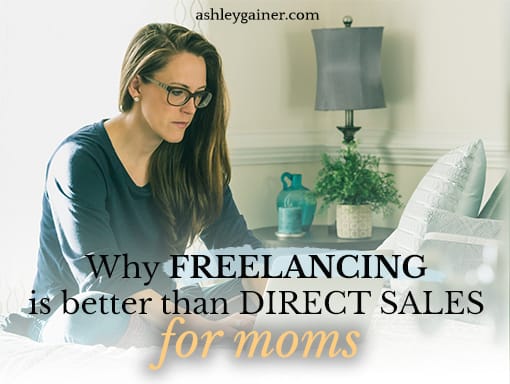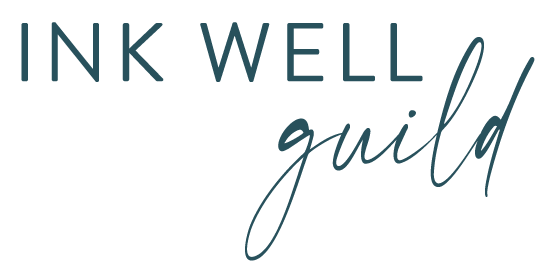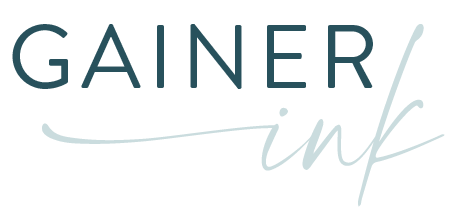A lot of people, especially women, and especially at-home moms, are looking for ways to contribute to the family finances without having to take a “job-job” that pulls them out of the home. Something that can be done from home, on their schedule, without taking up a million hours and a billion dollars is the goal.
Unfortunately, many of these moms (including you, maybe?) look at ways to make money from home that require some significant start-up costs. Direct sales is a big one contender in this department. It seems like half the people we know are sellers at this point, so it makes sense that these companies get a lot of attention from wanna-be-mompreneurs who don’t have many other business ideas.
Freelancing vs. DS: Time to face off?
Freelancing (any kind of freelancing, not just writing) is a pretty different business model when compared to direct sales. Yes, you’re an entrepreneur and you need to take your business seriously in both cases. Yes, you have to learn marketing. Yes, your network comes into play. And yes, the longer you’re in, the more your income can grow.
All businesses have to be run like businesses if they’re going to succeed. All businesses have to market themselves. All businesses have the opportunity to scale when done right.
As a veteran of both money-making ventures, I thought it’d be interesting to write a post comparing the two, and then share my opinion on what works best for me and for people like me. (Hint: You can preview my conclusion right in the title of this post!)
The down-side to direct sales
Direct sales opportunities are everywhere, and with good reason. They’re presented as an “exciting opportunity” that “practically sells itself” and that you can “do from your smartphone.” And while most of that’s true, it’s nowhere near the entire picture.
- The startup costs are typically higher than, for example, freelance writing (which has an extremely low barrier to entry). There are some DS companies with low “kit fees” (aka join-up costs). Avon, for example, has a $25 buy-in. That’s something many people can afford, and last time I used any, I thought Avon’s stuff was still pretty good. But both DS companies I’m with have starting fees at $100 or more. You get a ton of value with that $100 kit, but it’s still $100. (The current Thirty-One kit is one of the best bargains I’ve seen on anything, anywhere, every, by the way!)
- Many of the real-life examples we have of direct selling are bogus. Raise your hand if you have a friend who has pressured you to buy something or added you to their Facebook group without asking you first. That is not good marketing, but it’s what a lot of people do. You have to be willing to learn another way of operating, and because so much of this is a foreign concept to a lot of people, it can be hard to learn the ropes. It’s much easier to give up in frustration.
- Marketing yourself can be tough, especially if you don’t know what you’re doing.
- Uplines can be hit-or-miss. Your upline is basically the people who are directly “above” you in the organization, and if you sign onto a team with an uninvolved upline, you’re pretty much stuck — you can’t join someone else’s.
- You exhaust your personal network fairly quickly, which means you need a crash-course in direct sales marketing or else you’re doomed.
- You have to be a social leader. This is hard for some people! It’s been really hard for me, I’ll just say.
- Some companies even make you (pre-purchase and) manage your own inventory. No, thank you. That’s not for me at all.
So… I know a lot of people who struggle with making anything more than a bit of pocket money with their direct sales business. It requires a very specific set of skills, and a lot of ladies don’t realize this and think that they’re failing and will never succeed. The truth is that you can learn the skills and have a much better shot of success… but is that really how you want to spend your time, slowly building something over time while you make mistakes all over your network?
The up-side to direct sales
I don’t mean to be completely down on direct sales. There are definitely some benefits. I know some very real moms with very real direct sales businesses that they’ve been working on for anywhere between 2 and 5 years — and they’re making way more money than I am. (Granted, they’ve probably also put in way more time than I have, since I maintain very-part-time hours.)
Anyway. These are some of the great benefits that I’ve experienced first-hand, even as someone who’s somewhere between ground-level and first-rung on the direct sales ladder:
- One of the direct sales organizations I’m with (Thirty-One) refers to its consultants (aka sellers) as “the Sisterhood,” and I have absolutely, 100% felt like I’ve been a part of this sisterhood. There are some gals on my Thirty-One team that I interact with substantially more than I do my in-person friends. (It doesn’t hurt that I’m on a team full of fellow Disney World enthusiasts, so we have a lot more than just bags to talk about!) Many teams are like this, and if you can find a great team, you’ll have a much better time as a seller.
- When you have a good upline, you are really, really fortunate. Solid, knowledgeable reps who have been in this business longer than you have can be a fantastic resource. You get your questions answered quickly, they’re often on-the-spot training, you have access to all kinds of great (compliant) graphics, and there are always, always, always people sharing ideas for boosting sales and reaching new customers.
- You can get philanthropic. A lot of the folks on my specific team use their Thirty-One businesses to raise money for charities, organizations, and people in need. Whether it’s donating their commission, asking people to “sponsor” bags for things like NICU babies and chemo patients, or finding ways to take advantage of the (fabulous) customer specials, I’ve seen thousands of dollars and countless care packages go out the door. it’s truly inspiring.
- You can scale if you want to. With direct sales, you can develop additional streams of income aside from your own sales and commissions if you’re willing to do things like build (and market) a blog, write books for sale, or get into selling side-products like business cards, pamphlets, graphic design, etc.
- If you can “get it,” you’ve got a true business on your hands. Direct sales is a way of life. You become “a product of the product” and you’re always looking for opportunities to “share,” aka tell people about your products. If you understand how to work this, then it comes off completely naturally. If you don’t “get it,” you come off as a used car salesman. Finding the right balance with sharing leads to a lot of success for a lot of people.
- There are tons (and tons and tons and tonnnssss) of great products out there, which means there are tons of opportunities. Tried essential oils and didn’t love ‘em? There’s still makeup, jewelry, clothing, nutrition, and pretty much everything else under the sun.
All of that to say, when you find the right fit and you get the right training, you can do really well for yourself. If you want to grow FAST, you’ll have to be willing to put in a lot of time and effort from the beginning.
A lot of DS organizations have fast-track promotion programs that give you anywhere from 3 to 6 months to promote a couple of levels within the organization for massive rewards. If you’re all about it and can figure it out quickly, this is a fantastic way to get off with a bang.
The down-side to freelancing
Now. I’ve been a freelancer since 2010. I love this way of working from home. Love love love it.
But if there’s one thing I’ve learned over the years, it’s that freelancing isn’t for everyone. No matter how much I want to be a freelancing evangelist and be your #1 cheerleader… there are some people who just aren’t going to get it off the ground because it’s not the right fit.
These are some of the common hang-ups and obstacles to going from wanna-be to bona fide freelancer:
- “But I’m not a good writer.” Whether you didn’t do well in English class, you never got a degree, or you just never thought of yourself as a writer, having your identity wrapped up in “the ability to write” (or not) makes a lot of otherwise-qualified folks walk away from the idea of writing before they really even give it consideration.
- It’s intimidating. Starting any new venture is intimidating, but (unlike with direct sales) freelance services don’t really “sell themselves.” You’re required to do some actual work of self-promotion, which people don’t like.
- There are about a bazillion options. You can do just about anything that involves words anywhere, ever, when you’re a freelance writer. How do you know where to begin??
- There’s a big learning curve. Just like with direct sales, I might add. This is a turn-off for a lot of people, though, because the learning curve is a lot more obvious right from the outset.
- It takes work. No bones about it. You have to have a solid work ethic if you’re going to make it work. You have to be willing to carve out the time, every day, no matter what. It’s not going to just “happen for you” if you aren’t making it happen.
- It takes real guts. As a writer, pitching stories and services, you face a ton of (possible) rejection. People don’t like rejection. It’s not fun. And when you’re buckling down and building your writing business from the ground up, there are tons of opportunities for people to tell you they want you… if they aren’t just ignoring you entirely.
- Finding your niche can take time. Having a niche is a great thing, but it’s also a tall hurdle for a lot of beginners. “I don’t know what to write about” is where many would-be writers stop short. It’s really just an excuse, but it’s an “easy” excuse to make.
- Finding your community can take time. As opposed to direct sales, which ideally will give you a built-in network of other folks at all different levels in the organization, you’re on your own as a freelance writer. It’s up to you to find group to plug into, send emails, and make connections. You could go it alone if you wanted, but I wouldn’t recommend it.
In short, building a freelance business takes guts and effort. But doesn’t anything that’s worth doing take guts and effort?
The up-side to freelancing
Just like with all great opportunities, there are some major perks to freelance writing. I love being a writer, and these are some of the reasons why I want to tell the whole world about it:
- Anyone who can write can get paid to write. It’s really that simple. If you can string coherent thoughts together with words, you can be a freelance writer. You don’t even have to be “a writer.” (I am so not “a writer,” y’all.)
- No degrees or special education are necessary. Seriously. You don’t even need to have a GED to be a freelance writer. I know folks who are still in high school who are making money as freelance writers. It’s also a great way to get some extra pocket money when you’re in college. But seriously — all you need is the ability to communicate effectively with words.
- You can raise your rates and make more money whenever you want. Granted, this is within reason, but if you’ve got the experience and the writing chops, you can feasibly pull in $300/hr as a freelance writer. (This is what I’m working toward!)
- There’s no “buy-in” to start. Any start-up costs are the ones you choose. I would recommend setting up a bare-bones website, but that’ll just run you about $20 for the domain and a month of hosting. Get in when Godaddy is having a sale, and you can spend $15 for an entire year. Not bad!
- There’s an extremely supportive community. You have to be deliberate about plugging into it, but it’s there and ready to embrace you.
- Unlimited income potential. It’s a lot easier to scale to a full-time income with freelancing than it is with direct sales. Between raising your rates and developing additional streams of income, there really is no limit to what you can earn as a writer.
I love freelancing because it allows me to be my own boss and make all my own decisions. I’m in full control of my time, and I don’t have a bunch of people reporting to me or needing things from me. I can leave work at my desk and attend to my family whenever it’s necessary, and as long as I’m meeting my deadlines, things move along smoothly.
There’s a high income ceiling for freelance writers (a friend of mine is a well-known freelance writer who brings in multiple-six-figures just from her writing!), which means that with some skill and a bit of planning (and zero dependency on — or micro-managing of — others), my income can go up and up and up without requiring additional time from me. I am all about that.
So which is better?
Both are legitimate. Let me just say that up front.
But it should be no surprise that I think freelancing — especially freelance writing — is one of the absolute best options out there for mamas who want to work from home. The barrier to entry is low, there’s no need for special education, you can learn as you go, and your income can go up significantly higher, significantly faster than with most direct sales setups.
But the reality is, being a freelance writer isn’t for everyone. It works well for a lot of people — and a lot of people dismiss it when it’s actually a viable opportunity for them. But it’s not for everyone.
Direct sales is a great fit for some people. If you have the right temperament, you’re truly committed to learning how to do it right, and you really love what you’re selling, the right direct sales team can carry you to some pretty fantastic income levels for less-than-full-time hours. But based on what I’ve seen, there are a lot more people struggling with their direct sales businesses than there are success stories.
If you want something that lets you be independent (read: you don’t need a “team” to succeed), freelancing is absolutely a great path to explore. If you love learning, sharing, and interacting, direct sales might be a good option.
In my mind, though, the best thing I can do for my family when I’m working from home is to find work that demands as little as possible from me.
For me, direct sales is fun but it’s also draining. There are sales targets and minimum requirements and incentives that will disappear after a certain amount of time, all of which add a layer of stress and emotional noise. There are monthly changes in customer specials and whatnot. There are all kinds of moving parts that I have to maintain. I have to follow up with my team regularly. I’m fielding questions daily. I never update my customers enough, and that’s a mental drag.
It’s draining.
But not so with freelance writing.
Sure, pitching can be a little stressful, and there’s the occasional (but mostly rare) gig that really gets under my skin for one reason or another. But for the most part, my clients are extremely easy to work with. There’s no drama. It doesn’t draw on my emotional reserves at all.
The less I’m emotionally drained by my job, the more I have available to give to my family. I got into freelancing specifically to have as much of me available to my family as possible, and I imagine the same would be true for you.
And that’s precisely why I think freelance writing is a much better option than direct sales for the at-home mom who wants to make some real money.
Now it’s your turn. Tell me what you think sounds more enjoyable and would be right for you!




